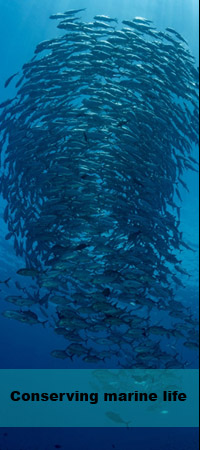|
Coral reefs, the “rainforests of the sea,” are some of the most biodiverse and productive ecosystems on earth. Corals probably date back at least to the time of the dinosaurs. They occupy less than one percent of the ocean floor, yet are home to more than a quarter of all marine species: crustaceans, reptiles, seaweeds, bacteria, fungi, and over 4,000 species of fish make their home in coral reefs. With a global economic value of $375 billion a year, coral reefs provide food and resources for more than 500 million people in over 100 countries and territories. But tragically, coral reefs are in deep crisis.
Life on Earth including human beings depends heavily on its magnificent and complex ocean ecosystems. But the seas are suffering from pollution, overfishing, loss of key habitat—such as coral reefs—and the depletion of important species from sharks to small fish that are the basis for the entire food web. Coral reefs are biodiversity reservoirs and significant sources of food, income, and pharmaceuticals. We have a small window of opportunity remaining to rescue the world's degrading reefs.
Our work to save and restore ocean ecosystems includes efforts to create effective marine reserves; end illegal fishing and overfishing; protect key species such as penguins, sharks, tuna and forage fish; remove plastics from ocean and prevent them to enter waterways; and encourage enforcements of existing policies that protect, maintain, and restore the health of marine ecosystems. By looking at case studies of long-standing marine protected areas from around the globe including our own conservation work, we have good reasons to hope that the future of our ocean could be brighter if we act now. For example, marine protected areas enhance herbivory rates on coral reefs. Herbivory on coral reefs is crucial because it mediates coral–algal interactions in favor of reef-building corals. Protected marine areas increase the species richness of herbivorous fishes, which, in turn, enhances browsing rates on macroalgae, ecosystem health and resilience for coral reefs.
Why give?
We don't spend a lot of time or money promoting ourselves — in fact we spend one percent of our budget for fundraising. We put your donations directly to work saving wild creatures and the wild places they call home. In the last 10 years, tp raise each $100 of cash donations from the public, it costs us less than $0.5. No wasting money, ESI is one the most efficient environmental and animal charity groups and we continue to allocates 98% of donations to conservation actions in the field where it is needed the most. Join us today and can protect endangered coral reefs and ocean with a monthly donation to Endangered Species International.
Related links

|











